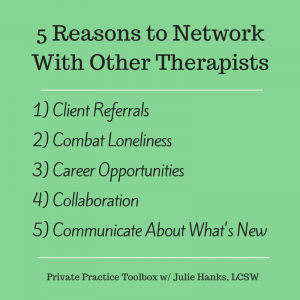 As therapists, it’s easy to become isolated. We see our clients, fill out paperwork, perhaps read a book or two to brush up on certain skills, then go home. I certainly don’t mean to imply that the work of a clinical counselor is rote or is not stimulating, but as the nature of therapy is very private, it’s quite possible to get into a routine that greatly limits our interaction with other professionals.
As therapists, it’s easy to become isolated. We see our clients, fill out paperwork, perhaps read a book or two to brush up on certain skills, then go home. I certainly don’t mean to imply that the work of a clinical counselor is rote or is not stimulating, but as the nature of therapy is very private, it’s quite possible to get into a routine that greatly limits our interaction with other professionals.
Through my 13 years in private practice and 20+ years in the mental health field, I have come to understand the power of networking with like-minded professionals. Networking is cultivating relationships to facilitate the exchange of information (which may be related to the nature of the profession and/or to career and employment). For our purposes, it simply means being in frequent and meaningful contact with other therapists! This strategy has greatly benefited my practice and also me personally and professionally in numerous ways.
Here are 5 reasons to get out of your office and begin networking with other therapists:
1) Client Referrals
Perhaps you've recently opened your practice and need to build your clientele. If you know others in the area and have begun to create those relationships, you have a valuable resource to draw upon. Introduce yourself to other practitioners in your area in case they know anyone seeking a therapist with your speciality (it's not self-serving; it's smart). Conversely, if you have a thriving practice and have the wonderful dilemma of having a higher demand for your services than you are able to provide, generously referring out is a way you can serve individuals even though you are not seeing them as clients. Network to learn of others you can contact if/ when this occurs.
2) Combat Loneliness
We teach our clients about the importance of self-care, but are we tending to our own emotional needs as well? We understand from attachment theory that we innately need connection with others; isolation is quite literally a form of torture, and many therapists I've worked with feel a real sense of disconnection seeing only clients all day. Reach out to others in order to fight loneliness and feel emotionally supported (read more here about this idea).
3) Career Opportunities
Beyond your work as a clinician, you can use your skills and talents to serve your community in other ways (such as through writing or consulting), and many of these opportunities present themselves through your relationships with others. Perhaps a colleague has suggested or inspired you to expand your activities. Networking has brought me personally many opportunities that I wouldn't have otherwise had. It's quite amazing the possibilities that can open up to you if you devote time and energy to cultivating those professional connections.
4) Collaboration
Going along with the previous point, finding ways to apply your skills other than by seeing clients is often best done in collaborative efforts. Combining your knowledge and experience with others in the mental health field is a great way to enrich and contribute to the professional community while simultaneously expanding your outreach. This very blog is infinitely more valuable because it contains not only my experiences, but those of others with whom I've networked and created relationships. Reaching out and working with others in the field can enhance your career accomplishments.
5) Communicate About What's New
If you're sitting in your office all day with only minimal contact with the outside world, it's unlikely that you'll hear about new developments in the field. But through continual networking and staying in touch with other clinicians, you can become aware of and familiar with new therapies and strategies that may enhance your practice. Regular contact with others can help you keep abreast of these new ideas, and you as well can offer your feedback on current topics and controversies relating to therapy.
What are reasons YOU network with others?
How has networking benefitted you?
Stay tuned for an upcoming post about therapist-friendly strategies to effectively network.
Visit the new PrivatePracticeToolbox.net for webinars and consulting services
Get 52 FREE Mental Health Blog Topics and prompts when you Sign up for the Private Practice Toolbox Newsletter here.
Join my Private Practice Toolbox Facebook group and connect with 3200 therapists around the globe in 2 simple steps:
1) Click request to join the group and
2) Fill out this brief questionnaire before you’ll be added to the group.



As healers, we genuinely like to do our work. Guiding clients through the therapy process and seeing them make progress is why we do what we do. But if you're in private practice, you know there's a lot going on in the back end and that it's crucial to run an efficient and organized business.